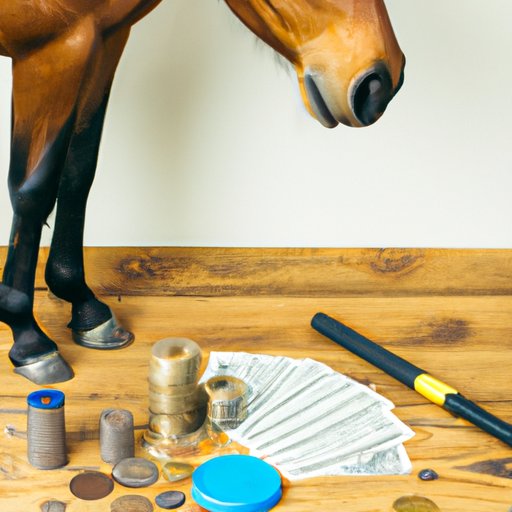Introduction
Horse ownership is an incredibly rewarding experience. Horses are beautiful, loyal animals that make great companions. But owning a horse also comes with a lot of responsibility — both financially and emotionally. Before taking on the commitment of horse ownership, it’s important to understand how much it will cost to maintain a horse.
In this article, we’ll explore the cost-benefit analysis of horse ownership, provide tips on budgeting for horse care, and offer a guide to horse maintenance expenses. We’ll also discuss the true cost of owning a horse, which goes beyond just financial costs.
Budgeting for Horse Care
If you’re considering buying a horse, it’s important to create a budget for horse care. Start by estimating the costs associated with horse ownership, such as feed, veterinary care, housing, farrier services, and training. Once you have an idea of the expenses, you can begin to plan your budget accordingly.
You should also consider utilizing financial resources like grants, sponsorships, and loans to help offset the cost of horse ownership. Many organizations offer low-cost or free services for horse owners in need. Doing some research can help you find the right financial assistance for your situation.
How to Make Horse Care Affordable
Once you’ve created a budget, it’s time to start looking for ways to reduce expenses. Many horse owners opt to do some of the routine maintenance themselves, such as grooming and hoof trimming. You can also look for discounts and deals on horse supplies, such as hay and grain. Additionally, there are many ways to save money on boarding and housing, such as finding a pasture buddy or bartering for services.

A Guide to Horse Maintenance Expenses
The following is a breakdown of typical horse maintenance expenses:
Feed & Supplements
Feed and supplements are essential for keeping your horse healthy. The amount you spend will depend on the type of feed you buy and the size and breed of your horse. Generally speaking, you can expect to spend anywhere from $100 to $400 per month on feed and supplements.
Veterinary Care
Regular veterinary care is essential for your horse’s health and wellbeing. This includes vaccinations, deworming, dental exams, and other preventative care. Depending on your horse’s needs, you can expect to spend anywhere from $50 to $500 per month on veterinary care.
Boarding & Housing
Boarding and housing are two of the biggest expenses associated with horse ownership. The cost of boarding will vary depending on the type of facility and amenities offered. Generally speaking, you can expect to pay anywhere from $200 to $1,000 per month for boarding.
Farrier Services
Farrier services, such as hoof trimming and shoeing, are essential for keeping your horse’s feet healthy. The cost of farrier services will vary depending on the type of work needed and the location of the facility. Generally speaking, you can expect to spend anywhere from $30 to $150 per month on farrier services.
Training & Showing
Training and showing are optional but can be a great way to bond with your horse. The cost of training and showing will vary depending on the type of program and instructor. Generally speaking, you can expect to spend anywhere from $100 to $300 per month on training and showing.

The True Cost of Owning a Horse
It’s important to remember that the cost of owning a horse goes beyond just financial expenses. As an owner, you’ll be responsible for providing daily care, monitoring your horse’s health, and making sure your horse gets enough exercise and socialization. Horse ownership also requires a long-term financial commitment, as the costs associated with horse ownership can add up quickly.
Additionally, horse ownership is an emotional investment. Horses require a lot of love and attention, and they can become an integral part of your life. Owning a horse is a big responsibility, but it can also be incredibly rewarding.
Conclusion
Horse ownership is a big commitment — both financially and emotionally. To ensure you’re prepared for the cost of horse ownership, it’s important to understand the different expenses associated with horse care. This includes feed, veterinary care, boarding, farrier services, and training. Additionally, it’s important to remember that the true cost of owning a horse goes beyond just financial costs.
With proper planning and budgeting, horse ownership can be an affordable and rewarding experience. With the right resources and support, you can enjoy the benefits of horse ownership without breaking the bank.
(Note: Is this article not meeting your expectations? Do you have knowledge or insights to share? Unlock new opportunities and expand your reach by joining our authors team. Click Registration to join us and share your expertise with our readers.)
